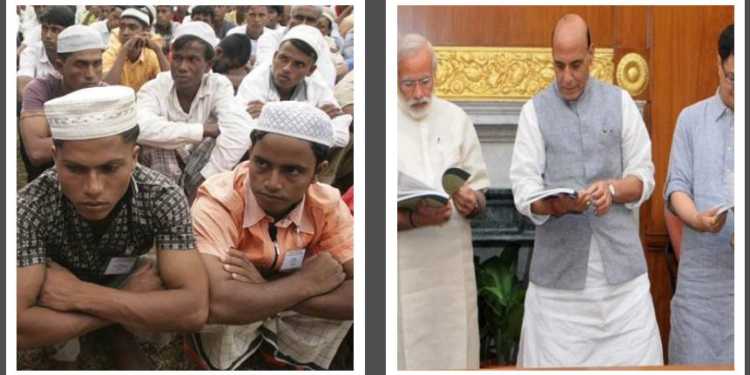A lot of concerns have been raised about the problems posed by the mass influx of Rohingyas in India. Pseudo seculars and liberals have gone about demanding the centre to provide them with a home and other necessities without realizing the toll it would take on the authorities and the demographics of the area where Rohingyas are resettled. This has become apparent in the Jammu area of J&K where tensions have kept escalating ever since the Rohingyas were allowed to freely settle in the region. West Bengal CM Mamata Banerjee and others of her ilk had even proposed bestowing Indian nationality on the Rohingyas who had illegally crossed borders to settle in the country and had found solace in West Bengal and other areas. Reports of Rohingyas butchering up Hindus and other minorities in Myanmar surfaced which showed the possible threats posed by their resettlement in the country. It is very difficult to assimilate a population belonging from a different culture and followers of a different moral code. The Central government too has realised the need to put a stop to the intermixing of Rohingyas with the Indian population which could pose security related threats to India.
On Saturday the 2nd of June, the Centre communicated to various states the methods which needed to be followed in order to keep the Rohingyas separated from the Indian population. The communication by the Central Government asks states to ensure that the Rohingyas are confined in specific identified locations. According to the letter, the Central Government issued the highlights of the “security risks posed by some of those Rohingya/foreigners who entered India illegally + and were involved in illegal activities such as fraudulent procurement and/or fabrication of Indian identity cards — PAN, voter IDs etc — money laundering, crimes and other anti-national activities”. The other measures include enrolling and recording their personal particulars, taking the biometrics of every individual immigrant and their address in Myanmar. The Centre has also advised the state governments not to issue Aadhaar or any other documents to the Rohingyas which may lead to them claiming Indian identity in the future.
This communication is a follow up of the September 2017 advisory issued to the various state governments by the Home Ministry. The settlements being carried out in large scale in Jammu area of J&K, Assam and in West Bengal had been questioned by the Home Ministry. A network of scamsters have been providing forged identity documents for the Rohingyas in Assam, West Bengal and nearby areas soon after they enter the country illegally. According to an intelligence officer as told to Times of India, “Of late, some attempts by Rohingyas to move to states like Kerala, Karnataka and Tamil Nadu have come to notice. There has also been new influx of immigrants into Jammu, Hyderabad, and Andaman & Nicobar Islands,”. According to the estimates put together by intelligence agencies, there are approximately 40,000 illegal Rohingya migrants settled across the country.
The Centre’s clampdown on mixing of Rohingyas with the local population has come at the right time as there could be severe threats arising from the intermixing. Myanmar Government has also recently released statements to take back any Rohingyas who are willing to resettle in the country. The Indian government’s decision to keep track of the Rohingya population will also help in the repatriation process once it begins. The presence of radical elements amongst the Rohingya population cannot be denied and the centre’s effort is laudable considering the potential risk they pose to the security and secular fibre of India.

























